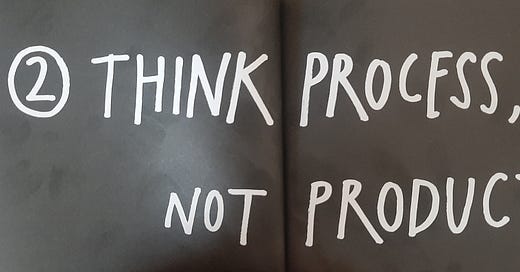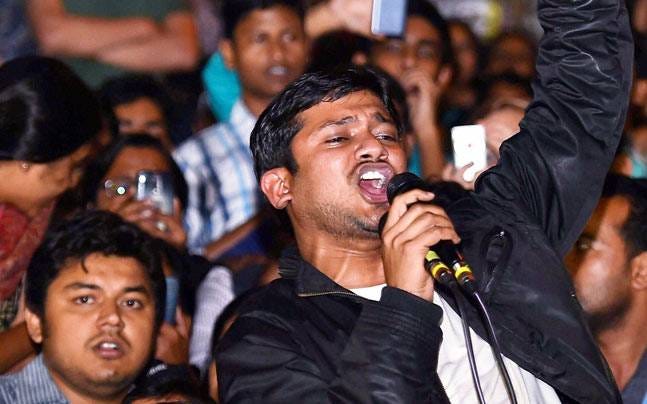Caution : Thought Police At Work.
Bookmarking an interesting phase of self-censorship in my university life.
Apology.
Before I start this week’s post, apologies for not dropping into your inbox last week. Just when I had started to get surprised by my consistency, the inevitable happened. Laziness won, I lost. I deviated from a very important hack to build creativity that Austin Kleon mentions in his book ‘Show Your Work” :
Not having a clue as to what I wished to write , I kept waiting for “the idea” and before I could realise, I was a week past the deadline. Hopefully this was the first and last time I let it happen.
**********************************************************************
Left Of Left Of Left.
It was on a peak summer afternoon when a bunch of us were sitting around a table, sharing food in the first floor office of SEWA Cooperative Federation in Ahmedabad when conversation about me quitting my job started. Priyanka, my manager, said something about me flying off the the UK soon. Another colleague, who was also due to leave for the UK to pursue her PhD at the same time as me asked, “Oh, where are you off to ?”. I told her that I had accepted my offer at SOAS. I don’t exactly remember how she responded, but she said something on the lines that if I thought I was left, then SOAS was left of left of left.
I remember driving back home that evening with a strange sense of nervous excitement. Having worn my ‘liberandu’ stance on my sleeve, the prospect of being on a liberandu campus seemed fun. I had a vivid imagination of a university campus in my head that I had been chasing ever since I saw Kanhaiya Kumar’s speech at JNU just after being released from jail. The university of my imagination was radical, vibrant, diverse and most importantly, it challenged conventional thought.
Sanghi.
In my first month in London, a bunch of students decided to start weekly ‘Bring Your Own Tea’ sessions at the accommodation where I live. The intent of the session was to engage with people on political developments in India and around the world, over a hot cup of tea.
I remember waking up just in time for the first BYOT session after a really cozy two hour nap on a cold Sunday evening . I was looking forward to meeting my neighbours and knowing what backgrounds they had come from. As it happens with most discussions that young, socio-politically engaged Indians have in today’s environment, the conversation moved towards the state of muslims in Modi’s India.
There was a broad consensus on how bad it really was for muslims under Modi’s rule. But as the discussion progressed, one loud opinion seemed to paint a picture that all the electoral successes that the BJP had tasted so far were a result of their communal politics. As I kept waiting for this opinion to get countered, I was surprised to see heads nodding in mild agreement. It seemed more like a discourse than a discussion at this point. The sense of polite agreement in the room was killing the idea of the university of my imagination. I decided to disagree, partly because I did disagree and partly just for the heck of it.
I started putting forward all the arguments that astute political observes have made in their analysis of the politics of the BJP. I proposed that while I agreed that communal politics was a major political plank used by the party, a host of other welfare schemes, big ticket infrastructure projects and the lack of a coherent opposition was adding to the winning streak of the BJP. Even though these welfare schemes had proven to be hollow and ineffective, I argued that if we were to pushback against the government, we needed a clearer understanding of why they are winning in the first place, and then a new narrative to counter it.
Suddenly the heads that were silently nodding in agreement with the other speaker started popping up and subtly agreeing with what I was saying. Maybe people had been thinking the same thing as me, but were a bit intimidated to say it out loud in front of a group of strangers. As I walked out of the session, I remember thinking if I had made a mistake by playing the devil’s advocate. Was I going to face difficulty in making friends for having made a seemingly pro government argument ? “You’re just overthinking”, I consoled myself as I walked back to my room.
I never crossed paths with the people I had disagreed with that night. I even forgot about the discussion as life got busier for everyone and the BYOT sessions stopped altogether.
Months later, I came to know through a friend that rumour mill was rife with news that I was a sanghi (an RSS sympathiser). While I shrugged it off by saying that I couldn’t care less, a part of me did become more conscious of what I said in public the next time.
Is 2023 the new 1984 ?
For those of you who do not know, 1984 is a book by George Orwell that is thematically based “on the consequences of totalitarianism, mass surveillance and repressive regimentation of people and behaviours within society. Orwell, a democratic socialist, modelled the authoritarian state in the novel on Stalinist Russia and Nazi Germany. More broadly, the novel examines the role of truth and facts within societies and the ways in which they can be manipulated.” (Source : Wikipedia)
While it is for sociologists, anthropologists and other academics to accurately tell if what I am feeling has any larger social resonance or not, but in the six months that I have spent on campus, I have double guessed my opinions and my decision to voice them openly on numerous occasions.
I spoke to a girl who was friends with a guy who had been accused of inappropriate behaviour by some other women on campus. The girl, based on her experience with the guy and his behaviour with and around her, decided to continue being friends with him. She said that she had spoken to the girls who had accused him of inappropriate behaviour and their stories did not add up or make sense to her. Over and above this, she said that the guy had been extremely courteous and caring with her and her friends and she did not find enough ground to cancel him out of her life. This decision of her to not block out her friend from her life led to her being socially boycotted. “It has been really weird”, she told me. “It has led to me not being able to walk around campus with my head held high, as if I have done something wrong to someone.”, she continued.
Another acquaintance told me how she wished she could sometimes express her opinion that making money is not always a bad thing in her economics class, but she doesn’t do it fearing a social backlash because of the marxist bent of the professor and the students in the classroom.
Is the suffocation caused by ideological homogeneity on campuses a result of conscious effort by some establishment ? Or is it just a product of our times ? I clearly have no answers to this. All I have is the unwavering image of a university of my dreams. A place where thought is as free as it possibly can be in society. A place where people across social, political, economic, religious and racial spectrum sit across a table and not just exchange ideas, but also build friendships, romantic relationships, healthy competitions and most importantly, human connections that outlive the momentary polarisation that our world has come to see. Till then, we’ve got to beware, because the thought police is at work.
**********************************************************************
If you liked what you read, do share it with others who you think might enjoy reading it too. If you did not like what you read, you can write to me at dhyanesh0212@gmail and tell me how can I do better.






